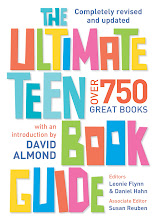To Roehampton this morning (after some trouble starting the car - with apologies again to Viv to whom I'd promised a lift...) for a half-day conference looking at the results of a major survey of reading habits conducted by the NCRCL in 2005, for children in Key Stages 1-4.
In the results themselves there was pretty little that was surprising, though that was interesting too - to have got those things we always refer to as a kind of received wisdom confirmed by some pretty robust statistics. So yes, it's true - boys won't read books about girls, and girls are less likely to read books about boys but aren't quite as determined in their prejudice; yes, boys are more likely to read about machines, monsters, cartoon characters, to read comics and non-fiction; lots of children like series books; etc.
It wasn't a study about reading abilities, but about reading habits - what children are reading (books, magazines, fiction, genres, non-fiction, comics, favourite authors, series...), how they choose their reading (influencers, sources), and so on. Little wonder - but again good to know, given our work on the UBGuides - that on the whole those with the best choosing skills are also those who get the greatest satisfaction from their reading.
The range of reading cited by respondents was depressingly predictable. Though even those who're well familiar (and who isn't?) with the massive, blanket-appeal of Harry Potter will surely be impressed that these books are the most popular in all four key stages, 1-4. In other words, from ages 5 to 16. Just stop and think about that for a moment...
Meanwhile overall favourite authors at KS2 were (in order) Jacqueline Wilson, Roald Dahl and JK Rowling; the list for KS3&4 was (in order) Wilson, Rowling, Dahl. A comparable survey carried out in 1996 saw Dahl topping both of these lists (in the company of Blyton - second in both groups - and Dick King-Smith / Stephen King in third places). No great surprises there either.
But one thing rather more surprising, and pretty heartening: since 1996 the amount of library book-borrowing has actually gone up. (Would you have expected that?) One possible factor posited today is the existence of the relatively recent Bookstart scheme, which has affected several years' worth of children who've since grown into the survey age-groups. This may indeed be one of what's surely a number of factors, but whatever is having this effect it's something to be grateful for - it's certainly not the kind of news we're used to hearing on this subject...
Lots of food for thought today. Thanks to Laura Atkins (UFBG contributor, I'm proud to say) who organised it, and the four interesting, engaging speakers. Will be ordering a copy of the full report in the coming days to look more closely. Fascinating stuff.
D.
12 years ago
.jpg)


No comments:
Post a Comment